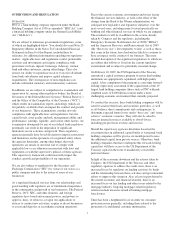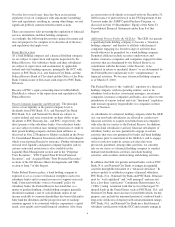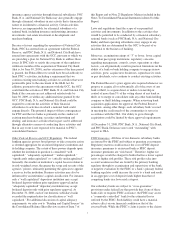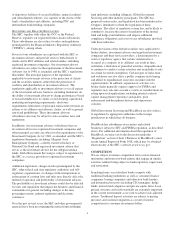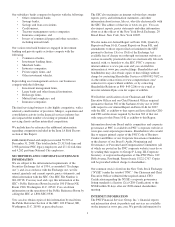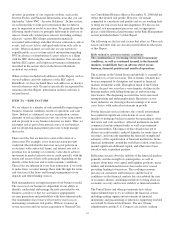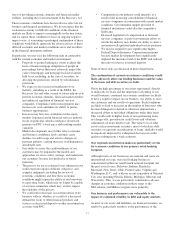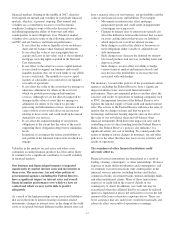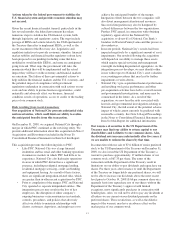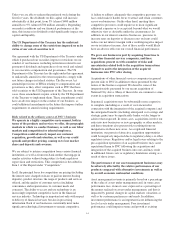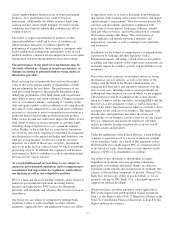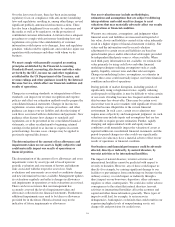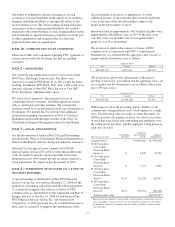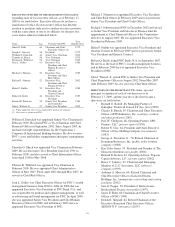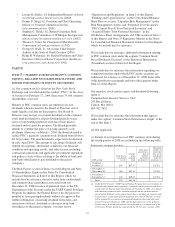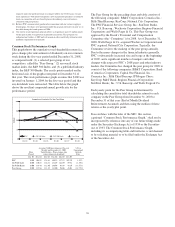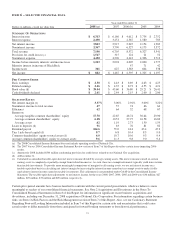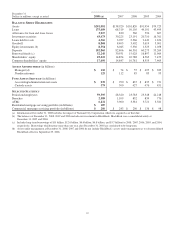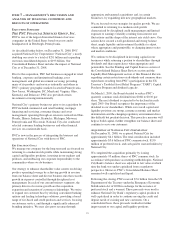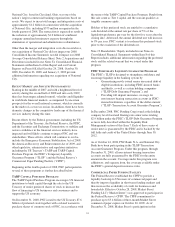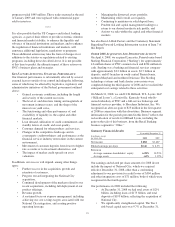PNC Bank 2008 Annual Report Download - page 19
Download and view the complete annual report
Please find page 19 of the 2008 PNC Bank annual report below. You can navigate through the pages in the report by either clicking on the pages listed below, or by using the keyword search tool below to find specific information within the annual report.clients might withdraw funds in favor of better performing
products. Also, performance fees could be lower or
nonexistent. Additionally, the ability to attract funds from
existing and new clients might diminish. Overall economic
conditions may limit the amount that customers are able or
willing to invest.
The failure or negative performance of products of other
financial institutions could lead to a loss of confidence in
similar products offered by us without regard to the
performance of our products. Such a negative contagion could
lead to withdrawals, redemptions and liquidity issues in such
products and have a material adverse impact on our assets under
management and asset management revenues and earnings.
The performance of our fund servicing business may be
adversely affected by changes in investor preferences, or
changes in existing or potential fund servicing clients or
alternative providers.
Fund servicing fees are primarily derived from the market
value of the assets and the number of shareholder accounts
that we administer for our clients. The performance of our
fund processing business is thus partially dependent on the
underlying performance of its fund clients and, in particular,
their ability to attract and retain customers. Changes in interest
rates or a sustained weakness, weakening or volatility in the
debt and equity markets could (in addition to affecting directly
the value of assets administered as discussed above) influence
an investor’s decision to invest or maintain an investment in a
particular mutual fund or other pooled investment product.
Other factors beyond our control may impact the ability of our
fund clients to attract or retain customers or customer funds,
including changes in preferences as to certain investment
styles. Further, to the extent that our fund clients’ businesses
are adversely affected by ongoing governmental investigations
into the practices of the mutual and hedge fund industries, our
fund processing business’ results also could be adversely
impacted. As a result of these types of factors, fluctuations
may occur in the level or value of assets for which we provide
processing services. In addition, this regulatory and business
environment is likely to continue to result in operating margin
pressure for our various services.
As a regulated financial services firm, we are subject to
numerous governmental regulations and to comprehensive
examination and supervision by regulators, which affects
our business as well as our competitive position.
PNC is a bank and financial holding company and is subject to
numerous governmental regulations involving both its
business and organization. PNC services its obligations
primarily with dividends and advances that it receives from its
subsidiaries.
Our businesses are subject to regulation by multiple bank
regulatory bodies as well as multiple securities industry
regulators. Applicable laws and regulations restrict our ability
to repurchase stock or to receive dividends from subsidiaries
that operate in the banking and securities business and impose
capital adequacy requirements. They also restrict permissible
activities and investments and require compliance with
protections for loan, deposit, brokerage, fiduciary, mutual
fund and other customers, and for the protection of customer
information, among other things. The consequences of
noncompliance can include substantial monetary and
nonmonetary sanctions as well as damage to our reputation
and businesses.
In addition, we are subject to comprehensive examination and
supervision by banking and other regulatory bodies.
Examination reports and ratings (which often are not publicly
available) and other aspects of this supervisory framework can
materially impact the conduct, growth, and profitability of our
businesses.
Due to the current economic environment and issues facing
the financial services industry, as well as the effect of the
change from the Bush to the Obama administration, we
anticipate new legislative and regulatory initiatives over the
next several years, including many focused specifically on
banking and other financial services in which we are engaged.
These initiatives will be in addition to the actions already
taken by Congress and the regulators, including EESA and the
Recovery Act. Developments to date, as well as those that
come in the future, have had and are likely to continue to have
an impact on the conduct of our business. This impact could
include rules and regulations that affect the nature and
profitability of our business activities, how we use our capital,
how we compensate and incent our employees and other
matters potentially having a negative effect on our overall
business results and prospects.
Under the regulations of the Federal Reserve, a bank holding
company is expected to act as a source of financial strength
for its subsidiary banks. As a result of this regulatory policy,
the Federal Reserve might require PNC to commit resources
to its subsidiary banks when doing so is not otherwise in the
interests of PNC or its shareholders or creditors.
Our ability to pay dividends to shareholders is largely
dependent on dividends from our operating subsidiaries,
principally our banking subsidiaries. Banks are subject to
regulation on the amount and circumstances of dividends they
can pay to their holding companies. At present, National City
Bank does not have any ability to pay dividends, so we are
primarily relying on PNC Bank, N.A.’s dividend capacity to
support our external dividends.
We discuss these and other regulatory issues applicable to
PNC in the Supervision and Regulation section included in
Item 1 of this Report and in Note 23 Regulatory Matters in the
Notes To Consolidated Financial Statements in Item 8 of this
Report and here by reference.
15


